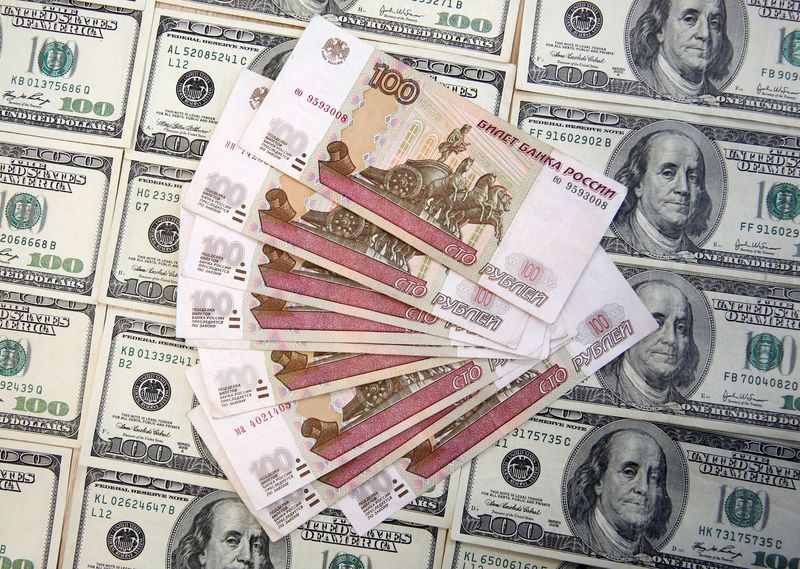By Sinead Cruise and Carolina Mandl
WASHINGTON/NEW YORK (Reuters) -Russian companies and global banks including BNY Mellon (NYSE:BK), Deutsche Bank (ETR:DBKGn), Citigroup (NYSE:C) and JPMorgan (NYSE:JPM) could profit if Moscow moves to de-list Russian companies' depositary receipts from foreign exchanges, according to two people familiar with the matter.
The potential windfall is due to the fees that bank issuers of depositary receipts can contractually charge investors when they cancel the product.
It is unclear how much companies and banks could make or if banks will charge the fees and risk angering investors who say it would be unfair given the extraordinary circumstances which have been triggered by Russia's invasion of Ukraine.
However, the fees could potentially translate into hundreds of millions of dollars according to Reuters' calculations based on fee data provided by the sources.
Assailed by Western sanctions, Moscow is preparing to de-list Russian company depositary receipts from foreign exchanges and convert them into local Russian securities in a bid to reduce foreigners' control over these companies.
Depositary receipts are certificates issued by a bank representing shares in a foreign company traded on a local stock exchange. They allow investors to dabble in overseas stocks in their own geography and time zone.
There are more than 30 depositary receipts on Russian companies including Gazprom (MCX:GAZP), Rosneft, Lukoil and Norilsk Nickel issued by BNY Mellon, Deutsche Bank, Citigroup, JPMorgan, among others, trading on U.S. and European markets.
Under standard agreements, depositary receipts can be canceled by the issuer or the investor. When that happens, the investor typically gets cash from the sale of the underlying shares, although they have the right to take custody of the shares instead.
Banks charge an administration fee, typically around $0.05 per receipt, which may be shared with the companies, two sources said.
If Moscow de-lists Russian depositary receipts, banks will have to cancel the products. Banks could still charge the fees, even though their hand was forced, according to three sources.
For example, an investor in Rosneft with 150 million depositary receipts representing the same number of shares in the company could be on the hook for $7.5 million in cancellation fees, according to Reuters' calculations.
Sweeping Western sanctions could make it challenging for banks to transfer the cash to some companies.
Regardless, some investors say the fees should not apply. One global asset manager told Reuters that if Russia passes the de-listing law there should be no fees as investors would have no choice in the matter. The other two sources, however, say banks still have to cover their costs.
BNY Mellon, Deutsche Bank, JPMorgan and Citigroup declined to comment. Russian companies did not respond to a Reuters emails seeking comment.
MARKET FREEZE
As Western sanctions pummeled Russian stocks from late February, the Moscow exchange closed and the Russian central bank banned foreigners from transferring shares out of their custody accounts. It also barred foreigners from selling Russian shares.
The restrictions made it nearly impossible for banks to cancel receipts when asked by investors anxious to slash their Russia exposure.
With curbs on custodians recently lifted, BNY Mellon, Citi and JPMorgan have resumed processing cancellations. But because the foreign banks still can't sell the shares, investors have to take custody of them instead. To do that, investors need an account in Russia, which many don't have.
As a result, a lot of investors are likely to hold onto the receipts for the time being, according to three people.
Many investors are worried, however, about the de-listing bill which Russia is preparing.

Aside from the potential cancellation fees, investors are worried about what will happen if they can't open a local custody account.
In a note to clients, JPMorgan said clients may be able to open a Russian account under some unspecified circumstances if the new law is passed.